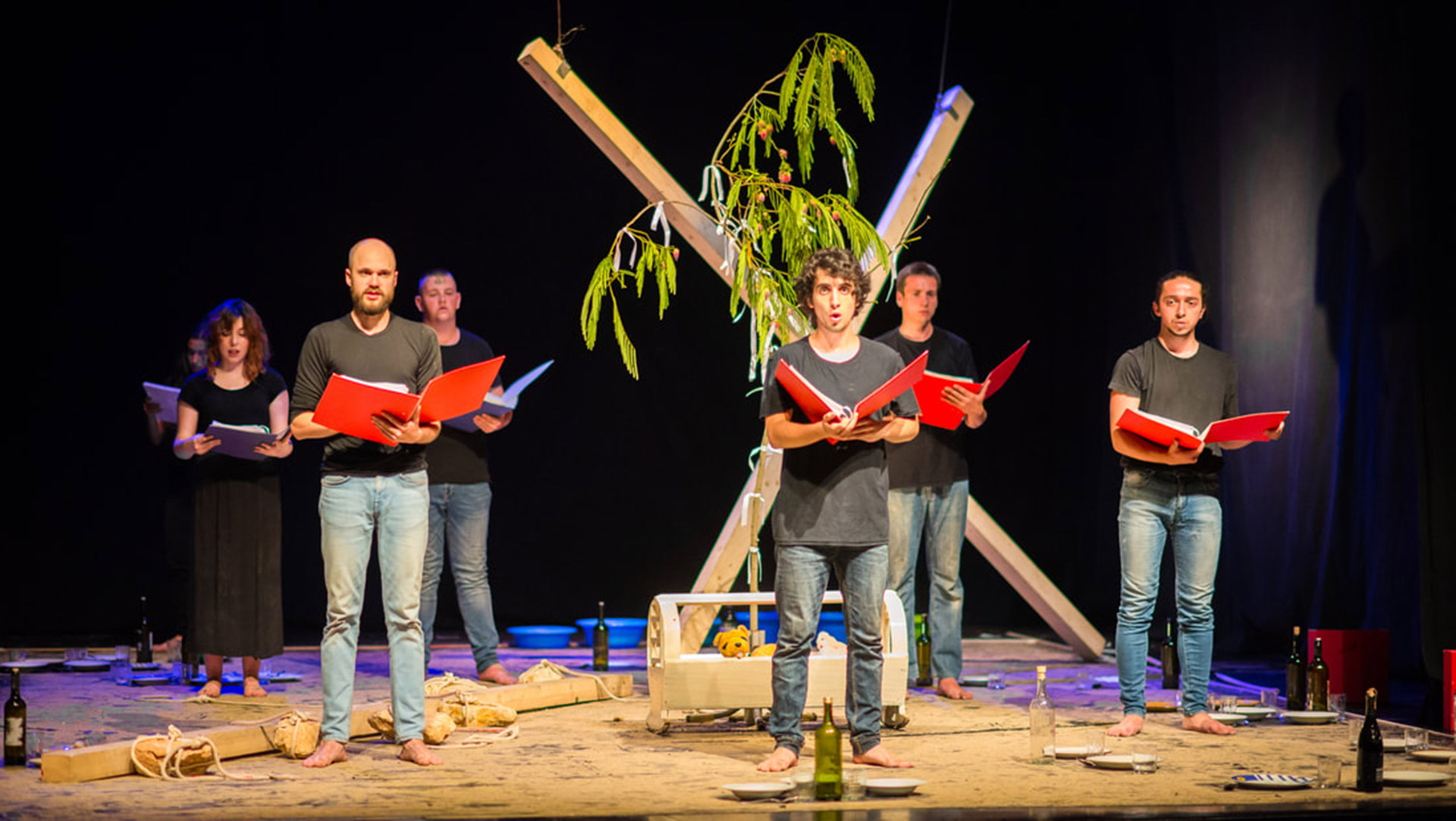
Both documentary and poetic, the new play, ‘‘The Lullaby for Mladenka,’’ takes crimes against Croatian civilians from the village of Grabovica in September 1993 as its subject. Members of the Army of the Republic of Bosnia and Herzegovina (ARBiH) killed 33 Croatian civilians, the oldest of whom was 87 years old and the youngest four. Play’s author is Sead Đulić, and it’s performed by the Mostar Youth Theater (eMTeeM).
‘‘On the 25th commemoration event of the crime in Grabovica, I said that I had the desire and the need, as a former ARBiH officer, to speak about this crime and make a play about it,” said Đulić. “My eight young actors in the theater had no idea about the events that took place in Grabovica, some did not even know where it was. I did not make the play to spite my own people, but to spite the criminals and their crimes. No criminal can be a friend of mine!”
Those who’ve seen the play say it has opened the process of dealing with the past, both in Mostar and in a wider contest. At the 33rd “Days of Youth Theatre,” the play won eMTeeM’s ‘‘Mask’’ award and was proclaimed, by audience choice, the best Mostar Youth Theater’s play of the past season.
‘‘I think this play is a solution to the war wounds in Mostar and I think it has great potential to be a solution for those who understand the play’s message in the right way,’’ said Edina Delalić, a member of Mostar Youth Theater and a lead actress.
The play also stars Šejma Delalić, Mia Musić, Anamarija Alpeza, Ali Kamer Aksoy, Haris Habibija, Alem Neziri, Damir Čobo, Miran Bečević and Faris Količić.
‘‘The Lullaby for Mladenka’’ is about a real event that took place during the ‘‘Neretva 93’’ military campaign. Members of the Army of the Republic of Bosnia and Herzegovina killed 33 civilians. 17 of those 33 bodies have still not been found.
‘‘This case is shocking and horrifying on its own, and the play only adds to the emotions and the shock,” Đulić pointed out. “The most shocking thing is that this story really happened, and it was done by the ARBiH.’’
‘‘The play got its name from a four-year-old girl, Mladenka Zadro, who was the youngest victim of this crime. We decided to make her the symbol of all the innocent victims who lost their lives in the past war. This project is a cry of young people seeking justice and peace in this country that will have no future unless the past gets resolved,’’ said Mia Musić.
‘‘The show has been seen by a diverse audience ten times so far in Mostar. It’s not over yet as we’re still collecting materials,” Đulić explains. “We might soon receive an important document, from the victims’ families, that will shed light on many of the things surrounding the Grabovica crime. What matters is that we have not sided on either side, we remain neutral and objective. We are only relaying what the courts have said; things that have been proven beyond reasonable doubt, whether someone likes it or not.’’
He said they had a lot of questions and comments, while creating the play, about why they were not doing the play about Vranica where the soldiers of the ARBiH were killed.
‘‘That story should be done as well,” added the author, “but I think that for the future of this country regarding reconciliation and facing the past, it should be done by a Croatian author when the conditions and circumstances are met. We are supposed to talk about what the soldiers of the army to which I specifically belonged did.’’
According to him, the play ‘‘holds the ARBiH accountable in the most honorable way.’’
In the less than year since the premiere of “The Lullaby for Mladenka,” it’s been performed 22 times3 of those outside Mostar: in Banja Luka, Žepče and Kotor.
So far, five former members of the ARBiH have been convicted of crimes in the village of Grabovica before the courts in BiH, but only for individual killings, not war crimes or genocide. The Cantonal Court in Sarajevo sentenced Enes Sakrak to 10 years in prison for the murders of Ljubica and Mladenka Zadro.
Mustafa Hota was sentenced to nine years in prison for the murders of Pero and Dragica Marić. The Mostar Cantonal Court sentenced Nihad Vlahovljak, Haris Rajkić and Sead Karagić to 13 years each. They were charged with the murders of three members of the Zadro family – Ivan, Matija and Mladen.
‘‘The more we worked on the play,” said eMTeeM member Anamaria Alpeza, “the more we all became aware of it. I think it is a good idea, because the public should become more aware of this topic because this crime should not be forgotten.’’






